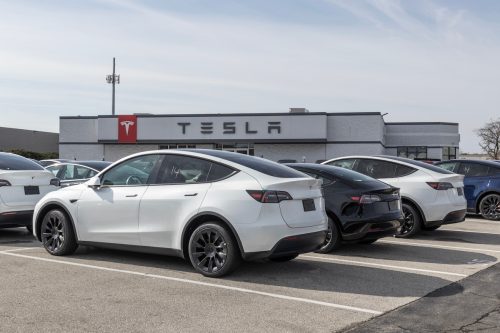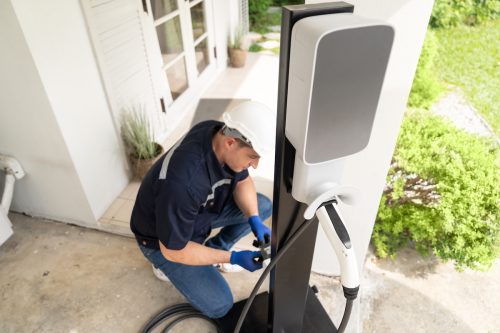How to Get the 2024 EV Tax Credit and Save Big on an Electric Car
This could overhaul your balance sheets in a big way.

Filing your taxes is a notorious drag—or, at the very least, a boring way to spend an afternoon. The task requires compiling your paperwork, lugging it to your accountant (or manually entering it into a site like TurboTax), and, in some cases, sending serious cash to the IRS. It's no one's idea of a good time, but if you know what you're doing, you can minimize what you owe. Enter: the EV tax credit. If you qualify for the electric vehicle tax credit, which has been around since 2008 and was revised in 2022, you could save thousands on this year's taxes.
Keep reading to learn everything that accountants and finance professionals want you to know about the credit, including what the 2024 EV tax credit is, who qualifies for it, and how much it's worth. If you've purchased an electric vehicle recently—or plan to in the future—it could overhaul your balance sheets in a big way.
RELATED: 6 Tax Mistakes That Could Get You Audited, According to Finance Experts.
What Is the EV Tax Credit?

The goal of the EV tax credit is to get more electric vehicles on the road.
"It's a financial incentive, at the federal level, to purchase a fully electric or partially electric vehicle," says Kyle Luetters, certified financial planner and advisor at Moneta. "Some states also offer an additional tax credit on top of the federal credit."
The credit, found in Internal Revenue Code Section 30D, can be worth as much as $7,500. However, you will not receive a refund if the credit amount brings your balance owed to the IRS below zero. (So, no, you can't make money off this credit; you'll simply owe less.)
The EV credit has existed for more than a decade, but recent changes now favor cars made in North America and allow buyers of used electric vehicles to take advantage of the credit, too.
The updates also impact when you receive your money. Until the end of 2023, you would get the cash when you filed your taxes; starting in 2024, you can get the credit at the time of sale (to make the purchase an easier pill to swallow) or when you file your taxes, whichever you prefer.
Who Qualifies for the 2024 EV Tax Credit?

Not everyone who purchases an electric vehicle qualifies for the 2024 EV tax credit. To make the cut, you need to have placed your electric vehicle in service in 2023 or after. (According to Luetters, that's a fancy way of saying, "You started using the car.") You must buy the car for personal use, as opposed to for resale purposes, and you must use it primarily in the U.S.
There are also income requirements: Your modified adjusted gross income (AGI) cannot exceed $300,000 for married couples filing their taxes together or a surviving spouse, $225,000 for heads of households, or $150,000 for everyone else. You can use your modified AGI from the year you purchased the car or the previous year. (Only one year needs to meet the income requirement.)
RELATED: 8 Things You Should Stop Buying If You're Middle Class, Financial Experts Say.
Which Vehicles Qualify for the EV Tax Credit?

A few factors come into play here, and your car dealer should be able to ensure the EV you choose fits the requirements.
For 2024, the car must have a battery capacity of at least 7-kilowatt hours, a gross vehicle weight rating of fewer than 14,000 pounds, be made by a qualified manufacturer, undergo final assembly in North America, and meet the critical mineral and battery component requirements.
The vehicle must also be new, and its manufacturer-suggested retail price (MSRP) can't exceed $80,000 for vans, sport utility vehicles, and pickup trucks, or $55,000 for other cars.
All of these bits of information should be available on the car's window sticker. You can also find information on each car—including whether or not it qualifies for the credit—at this link.
How Much Money Is the EV Tax Credit Worth?

This depends on several factors, including when you put the car into service. If you did so from Jan. 1 to April 17, 2023, you get a $2,500 base amount, plus $417 for a vehicle with at least 7 kilowatt hours of battery capacity and another $417 for each kilowatt hour of battery capacity beyond 5 kilowatt hours. The highest amount is $7,500 total.
If you placed the car in service after April 18, 2023, it's a bit different. "You get $3,750 if the vehicle meets the critical minerals requirement only, $3,750 if the vehicle meets the battery components requirement only, and $7,500 if the vehicle meets both," says Luetters.
"To meet the critical minerals requirement, a certain percentage of the critical minerals in an eligible EV's battery must have been extracted or processed in the United States, extracted or processed in a country with which the United States has a free trade agreement, or recycled in North America," writes the IRS.
To meet the battery components requirement, a certain percentage of the value of the battery components must be manufactured or assembled in North America. In 2023, that percentage is 50, for 2024, it's 60, and for 2025, it's 70. The percentage increases each year by 10 percent until it reaches 100 in 2029.
How to Get a Tax Credit for Your EV Charger and Charger Installation

The tax credits don't end with the car. "There is also a federal tax credit available for the cost to install charging equipment in your primary residence," says Luetters. "This credit is generally 30 percent of the costs, up to $1,000." As supporting documentation, when you file your taxes, you'll need a receipt for the equipment and for the labor to install it.
However, Letters says you might not want to file all that on your own. "As there are some nuances to this credit, please consult with a local tax pro," he advises. They'll be able to make sure you have everything you need to reap as many rewards from the credit as possible.
RELATED: 10 Car Brands With the Highest Accident Rates, New Data Shows.
How to Get a Tax Credit for a Used Electric Vehicle

This credit went into effect in 2023, and Luetters says it is often overlooked. The income requirements are lower ($150,000 for married people filing jointly or a surviving spouse, $112,500 for heads of households, and $75,000 for other filers), but the process is similar to the one for new EVS. You'll need to ensure both you and the car you've chosen qualify for the credit.
How to Claim Your EV Tax Credit Properly

This starts the day you purchase the car. "At the time of sale, the seller must provide you information about your vehicle and also register the sale online to report the same information to the IRS," says Moira Corcoran, CPA, tax expert for JustAnswer. "If they don't report online, your vehicle will not qualify."
Starting in 2024, buyers can transfer the tax credit to their car dealership to reduce the upfront cost of their new or used electric vehicle. Or, you can claim the tax credit when you file your taxes with Form 8936.
Save now or save later—it's your choice!
- Source: IRS: Credits for new clean vehicles purchased in 2023 or after
- Source: EPA: Federal Tax Credits for Plug-in Electric and Fuel Cell Electric Vehicles Purchased in 2023 or After
- Source: IRS: The Tax Credit Exception for Leased Electric Vehicles
- Source: Treasury Releases Proposed Guidance on New Clean Vehicle Credit to Lower Costs for Consumers, Build U.S. Industrial Base, Strengthen Supply Chains
- Source: IRS: About Form 8936, Clean Vehicle Credit





















